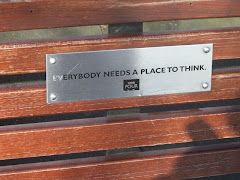Dulce Et Decorum Est
by Wilfred Owen, 1917
Bent double, like old beggars under sacks,
Knock-kneed, coughing like hags, we cursed through sludge,
Till on the haunting flares we turned our backs
And towards our distant rest began to trudge.
Men marched asleep. Many had lost their boots
But limped on, blood-shod. All went lame; all blind;
Drunk with fatigue; deaf even to the hoots
Of disappointed shells that dropped behind.
GAS! Gas! Quick, boys!-- An ecstasy of fumbling,
Fitting the clumsy helmets just in time;
But someone still was yelling out and stumbling
And floundering like a man in fire or lime.--
Dim, through the misty panes and thick green light
As under a green sea, I saw him drowning.
In all my dreams, before my helpless sight,
He plunges at me, guttering, choking, drowning.
If in some smothering dreams you too could pace
Behind the wagon that we flung him in,
And watch the white eyes writhing in his face,
His hanging face, like a devil's sick of sin;
If you could hear, at every jolt, the blood
Come gargling from the froth-corrupted lungs,
Obscene as cancer, bitter as the cud
Of vile, incurable sores on innocent tongues,--
My friend, you would not tell with such high zest
To children ardent for some desperate glory,
The old Lie: Dulce et decorum est
Pro patria mori.
(Translation from the Latin: "It is sweet and fitting to die for one's country" -- from Horace's Odes)
This poem was written by a soldier in World War I about one particular incident so common that it became the defining weapon of that conflict: gas attacks. Mustard gas, more specifically. When I read this poem a few months ago, it brought to mind what I've read about fears (later proven baseless) of chemical attacks on troops during the invasion of Iraq in 2003, and all the precautions taken because of that fear (if you don't know what I'm talking about, read and/or watch 'Generation Kill'). That correlation between wars separated by 90 years, numerous technological innovations, and the development of peace activism, really brought the point home that no matter how much technology is developed, the basic essence of war changes very little. It's still horrible, no matter how many 'smart bombs' and non-lethal ammunition developments there are. By the way, the poet, Wilfred Owen? He died a year after he wrote this poem, just one week before the war ended.
World War I, early twentieth century.
And Operation Iraqi Freedom, early twenty-first century.
Nothing ever changes.
DISCLAIMER: Neither of these pictures are mine, I found them both online.







No comments:
Post a Comment